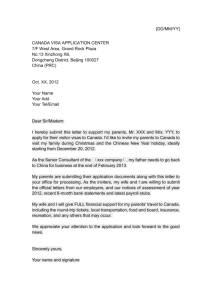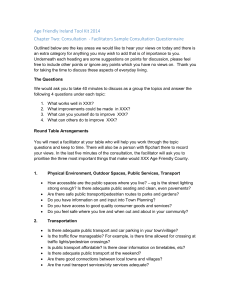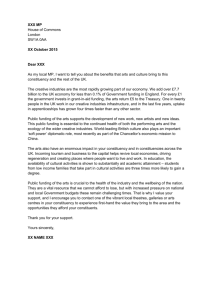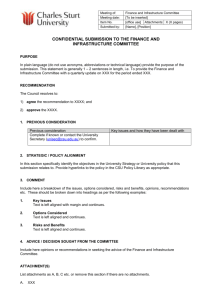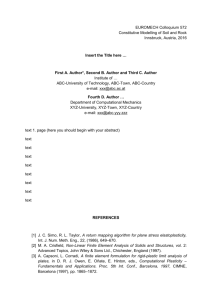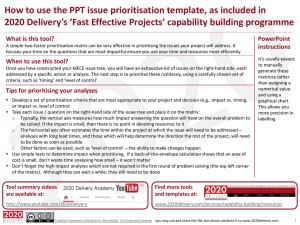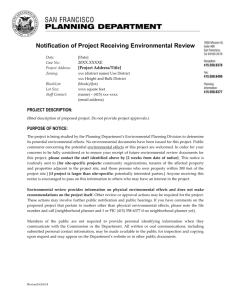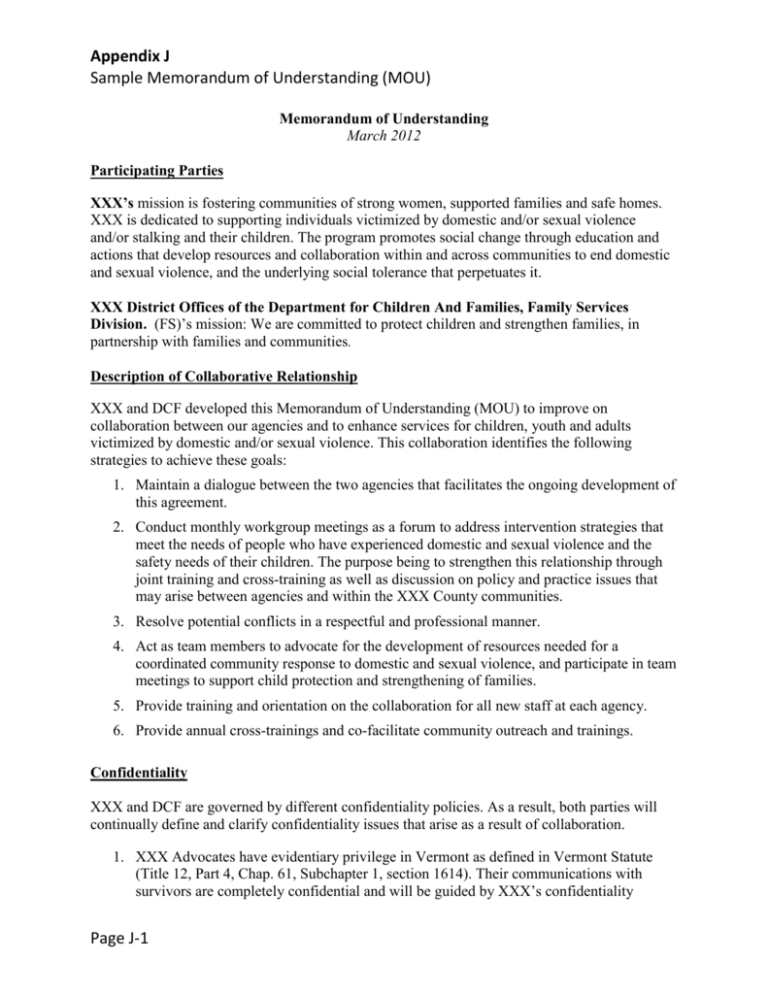
Appendix J
Sample Memorandum of Understanding (MOU)
Memorandum of Understanding
March 2012
Participating Parties
XXX’s mission is fostering communities of strong women, supported families and safe homes.
XXX is dedicated to supporting individuals victimized by domestic and/or sexual violence
and/or stalking and their children. The program promotes social change through education and
actions that develop resources and collaboration within and across communities to end domestic
and sexual violence, and the underlying social tolerance that perpetuates it.
XXX District Offices of the Department for Children And Families, Family Services
Division. (FS)’s mission: We are committed to protect children and strengthen families, in
partnership with families and communities.
Description of Collaborative Relationship
XXX and DCF developed this Memorandum of Understanding (MOU) to improve on
collaboration between our agencies and to enhance services for children, youth and adults
victimized by domestic and/or sexual violence. This collaboration identifies the following
strategies to achieve these goals:
1. Maintain a dialogue between the two agencies that facilitates the ongoing development of
this agreement.
2. Conduct monthly workgroup meetings as a forum to address intervention strategies that
meet the needs of people who have experienced domestic and sexual violence and the
safety needs of their children. The purpose being to strengthen this relationship through
joint training and cross-training as well as discussion on policy and practice issues that
may arise between agencies and within the XXX County communities.
3. Resolve potential conflicts in a respectful and professional manner.
4. Act as team members to advocate for the development of resources needed for a
coordinated community response to domestic and sexual violence, and participate in team
meetings to support child protection and strengthening of families.
5. Provide training and orientation on the collaboration for all new staff at each agency.
6. Provide annual cross-trainings and co-facilitate community outreach and trainings.
Confidentiality
XXX and DCF are governed by different confidentiality policies. As a result, both parties will
continually define and clarify confidentiality issues that arise as a result of collaboration.
1. XXX Advocates have evidentiary privilege in Vermont as defined in Vermont Statute
(Title 12, Part 4, Chap. 61, Subchapter 1, section 1614). Their communications with
survivors are completely confidential and will be guided by XXX’s confidentiality
Page J-1
Appendix J
Sample Memorandum of Understanding (MOU)
policy. This privilege belongs to the survivor and, therefore, may only be waived by the
survivor with informed consent. XXX Advocates do not actively seek this consent, but
work with survivors to identify the possible risks and advantages of allowing
communication with others, including DCF staff. Consent to release information shall be
given in writing by the survivor.
2. When an Advocate’s presence is requested at a meeting where other parties, who do not
have evidentiary privilege, will be present, the Advocate is responsible for explaining the
risks of compromising confidentiality to the victim and other parties, including that the
Advocate may be called to testify in criminal or child welfare court proceedings.
3. When participating in family teams, Child Protection Team or other collaborative groups,
XXX Advocates may provide general information and case consultation, but may not
divulge any details regarding specific survivors (including whether or not they are
receiving support from XXX) without the informed consent of the survivor.
Child Abuse Reporting
1. As sub-grantees of the Agency of Human Services, XXX employees are mandatory
reporters of child abuse. Advocates will follow Vermont mandatory reporting laws and
procedures.
Co-Occurring Domestic Violence and Child Abuse/Neglect Cases
1. Advocates and DCF staff, including DCF DV Unit Specialists, may seek information,
case consultation, and guidance from each other.
2. FSD Policy 61 “Responding to Domestic Violence in Child Abuse Intake and
Investigation” states: “It is widely accepted that in co-occurring child abuse and
domestic violence cases achieving safety and stability for children is closely linked to
creating safety for the adult victim. Removing risks posed by the batterer is critical to
achieving child safety.”
3. Interventions designed to address child abuse and neglect can potentially escalate
violence to adult and child victims of domestic violence. Social workers and supervisors
are expected to utilize case consultation provided by the Domestic Violence Unit.
4. All intakes that are identified with co-occurring domestic violence will be screened by
the DCF Domestic Violence Unit.
5. The Domestic Violence Unit will consult with District Office staff and all community
agencies involved in a community coordinated response to domestic violence.
Specifically, the DCF DV Unit will assist in developing investigative and case planning
strategies that will not increase risk to victims of domestic violence and their children
while holding batterers accountable for the risks they pose to their children.
Page J-2
Appendix J
Sample Memorandum of Understanding (MOU)
6. FSD Policy 51-Section F, Risk of Harm states “situations the Division Does Not
Investigate: the only allegation is that a child has witnessed or been exposed to domestic
violence.”
Referral Policies
1. XXX’s services are completely voluntary. Community partners are encouraged to inform
individuals about the supports available through XXX and to call to get general
information on behalf of an individual who may wish to work with an Advocate.
Advocates must speak directly and privately with an individual prior to initiating any
support activity to establish that they desire services. XXX cannot accept referrals of
individuals who feel compelled to participate in support activities. This policy protects
other victim/survivors, as people forced to engage with XXX may be less likely to uphold
confidentiality, may be disruptive in support groups, etc.
2. Eligibility for services through XXX is explained in the XXX Program Policies document
(attached). All individuals who contact XXX are screened to determine eligibility and
potential conflicts. Eligible individuals with whom the agency or an individual Advocate
has a conflict are referred to another Advocate or program, depending on the nature of the
conflict. Ineligible individuals are made aware of community resources that are available
to them, but are not referred to another DV/SV program.
3. DCF encourages XXX to make referrals to CPT, Resource Team, and the ACCESS Team
(Family Safety Planning Meeting).
4. DCF works with the whole family when constructing case plans and making referrals.
Changes to the Memorandum
MOU partners recognize that this is a living document, and may be amended to reflect changes
in the collaboration. The MOU will be revisited at least annually.
This MOU will govern XXX’s partnership with the XXX District DCF Offices from [dates].
Acceptance
XXX and the XXX DCF office agree to work together to implement the objectives of this
collaboration, to maintain communication, and to ensure accountability to the community
through this agreement.
_________________________________
XXX Program Coordinator
XXX
______________________________
District Director
XXX District Office
Dept. for Children and Families
Family Services Division
Date: ____________________________
Date: _________________________
Page J-3

